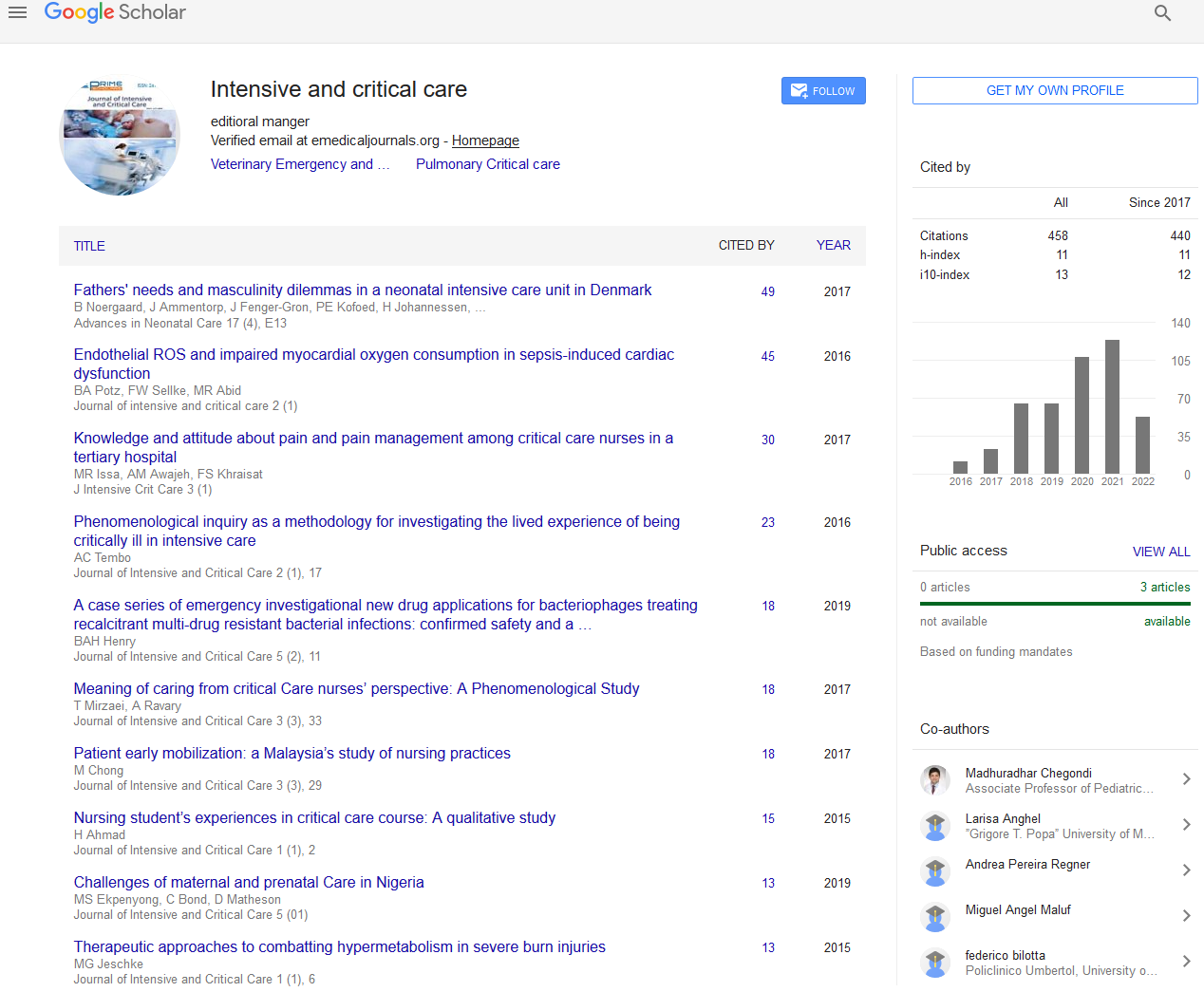Commentary - (2023) Volume 9, Issue 3
The Part of Liver Work within the Setting of Cirrhosis with Inveterate Disease and Basic Sickness
Philip A Efron*
Department of Surgery, University of Florida, Finland
*Correspondence:
Philip A Efron,
Department of Surgery, University of Florida,
Finland,
Email:
Received: 31-May-2023, Manuscript No. IPJICC-23-16788;
Editor assigned: 02-Jun-2023, Pre QC No. IPJICC-23-16788 (PQ);
Reviewed: 16-Jun-2023, QC No. IPJICC-23-16788;
Revised: 21-Jun-2023, Manuscript No. IPJICC-23-16788 (R);
Published:
28-Jun-2023, DOI: 10.35248/2471-8505-9.3.27
Description
Chronic critical illness is a condition that presents a significant
challenge to patients, caregivers, and healthcare professionals
alike. Unlike acute critical illness, which often resolves within a
relatively short period, chronic critical illness is characterized
by a prolonged state of severe physiological instability. This
condition poses unique medical, psychological, and social challenges,
requiring a comprehensive understanding and multidisciplinary
approach to management. In this article, we will delve
into the complexities of chronic critical illness, explore its causes
and manifestations, discuss the challenges faced by patients
and caregivers, and highlight the importance of a holistic care
approach to improve patient outcomes. Chronic critical illness
refers to a state of severe physiological instability that persists
beyond the acute phase of critical illness, typically extending
for weeks to months. Patients with chronic critical illness often
require prolonged mechanical ventilation, suffer from multiple
organ dysfunctions, and experience significant morbidity and
mortality rates. The condition is commonly seen in patients
who have experienced a severe insult to their health, such as
trauma, sepsis, or Acute Respiratory Distress Syndrome (ARDS).
The precise mechanisms underlying chronic critical illness are
not fully understood, but it is believed to result from a combination
of factors, including the sustained activation of the
immune system, persistent inflammation, and organ dysfunction.
The complex interplay between these factors can lead to
a state of ongoing instability and a vicious cycle of worsening
organ dysfunction. Patients with chronic critical illness present
with a myriad of clinical manifestations and face numerous
challenges throughout their illness trajectory. Physiologically,
they often exhibit respiratory failure, requiring prolonged mechanical
ventilation, along with cardiovascular instability, renal
dysfunction, and impaired gastrointestinal function. These
patients frequently experience muscle wasting, impaired immune function, and nutritional deficiencies, further complicating
their clinical picture. Psychologically, chronic critical illness
can have a profound impact on patients and their families.
Prolonged stays in Intensive Care Units (ICUs), frequent invasive
procedures, and the uncertainty surrounding prognosis
can lead to high levels of anxiety, depression, Post-Traumatic
Stress Disorder (PTSD), and impaired quality of life. Caregivers,
including family members and healthcare professionals, also
face significant emotional and physical burdens while providing
support and managing the complexities of long-term care. The
challenges in managing chronic critical illness are multifaceted.
They encompass medical decision-making regarding life-sustaining
treatments, ethical dilemmas surrounding end-of-life
care, resource allocation, and long-term care planning. Additionally,
the transition from the acute phase of critical illness
to the chronic phase requires a shift in care goals from a focus
on cure to one that emphasizes symptom management, quality
of life, and patient-centred care. Given the complexity of
chronic critical illness, a holistic and multidisciplinary approach
is paramount in providing comprehensive care. This approach
involves a collaborative effort among healthcare professionals,
including intensivists, respiratory therapists, physical and occupational
therapists, nutritionists, psychologists, social workers,
and palliative care specialists. Chronic critical illness is a complex
condition that poses numerous challenges for patients,
caregivers, and healthcare professionals. It requires a holistic
and multidisciplinary approach to address the physical, psychological,
and social dimensions of care.
Acknowledgement
None.
Conflict Of Interest
The authors declare no conflict of interest.
Citation: Efron PA (2023) The Part of Liver Work within the Setting of Cirrhosis with Inveterate Disease and Basic Sickness. J Intensive Crit Care. 9:27
Copyright: © 2023 Efron PA. This is an open-access article distributed under the terms of the Creative Commons Attribution License, which permits unrestricted use, distribution, and reproduction in any medium, provided the original author and source are credited.

